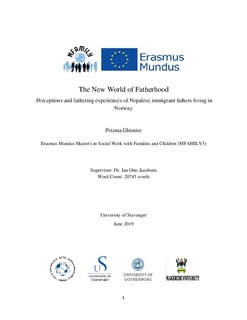| dc.description.abstract | Title: The New World of Fatherhood: Fathering practices of Nepalese immigrant fathers living in Norway.
Author: Prizma Ghimire
Supervisor: Dr. Jan Otto Jacobsen
Keywords: fatherhood, fathering practices, paternal involvement, involved fatherhood ideal, gender norms, parental leave, father-child relationship, breadwinning, caregiving immigration, acculturation, resilience
Background: Globally, people are on the move because of various reasons. The migration journey is an exemplary experience and fathers experience this journey in their own ways. This study sits at the intersection of migration studies and social work incorporating the migration journey, the acculturation process and assessing fatherhood in the context of immigration. Framed by interpretive framework, the study explores the nuanced understanding of fatherhood, the symbolic meaning of fatherhood, ideals of involved fatherhood and the cultural transmission that occurs within their fathering practices. Furthermore, the study explores on opportunities and challenges experienced by fathers while settling Norway.
Methods: Qualitative research method was pursued using semi-structured, in-depth interviews conducted between February 2019 and April 2019 with seven immigrant fathers from Nepal currently living in Norway with their families. The interviews were conducted and transcribed in native language–Nepali and then translated to English. The transcribed material was then coded, and emergent themes and sub-themes were identified. The data analysis process was done manually using six-phase data analysis process recommended by Braun & Clarke (2006).
Findings: The findings of this research first explore the participant’s own ideals on fatherhood as they construct symbolic meaning of being a father and the transition that they have been through. The symbolic meaning of fatherhood mainly resonated as the intersection of a spiritual realization regarding fatherhood such as gaining more meaning to life alongside a social reality of earning and providing for the family. As expressed by participants, becoming a father meant more adherence to their responsibilities, upgraded social status, the triadic bond they developed within the family which aligns with a resilient/generative perspective of fatherhood (Roer-Strier et al. 2005). Secondly, the findings also revealed how fathers envision their roles in the everyday lives of their children and how do they put it in practice–analyzed as involved fatherhood ideals. Likewise, Life experiences as immigrant fathers–the third thematic exploration traced the life trajectories of immigrant fathers, the opportunities and challenges as they navigate through different situation and circumstances in a new country. The findings revealed that some facets of life such as breadwinning responsibilities, cultural continuity, underemployment and generation gap that emerged in the empirical findings posed come challenges to their fathering abilities however, in a bigger picture, the articulated understanding of involved fatherhood ideals within themselves, their positive attitude towards changing gender dynamics within their household, diasporic consciousness, the trust in the Norwegian welfare system, and their hopes and aspirations for the future exhibited the ingrained resilience and strength of the immigrant fathers. In this regard, the findings from this study surpassed the deficit theory, that usually undermines the capabilities and potential of immigrant fathers rather, displayed a greater sense of resilience among immigrant fathers while overcoming various challenges along the migration journey and acculturation process.
Conclusion: The research represents the voices of immigrant fathers that aren’t often covered by mainstream fatherhood researches. Moreover, it contributes to the almost non-existent experiences of Nepalese immigrant fathers in a Norwegian context. Likewise, the findings from this study counters the deficit theory of immigrant fathers and articulates on the resilience exhibited by immigrant fathers that are often undermined in the immigrant fathers’ research. The findings and analysis from this research study suggest instrumental policy recommendations, practice and potential research development indicating the need of immigrant fathers, and by recognizing the policies and practice in order to facilitate their acculturation process and settlement in Norway. | nb_NO |

